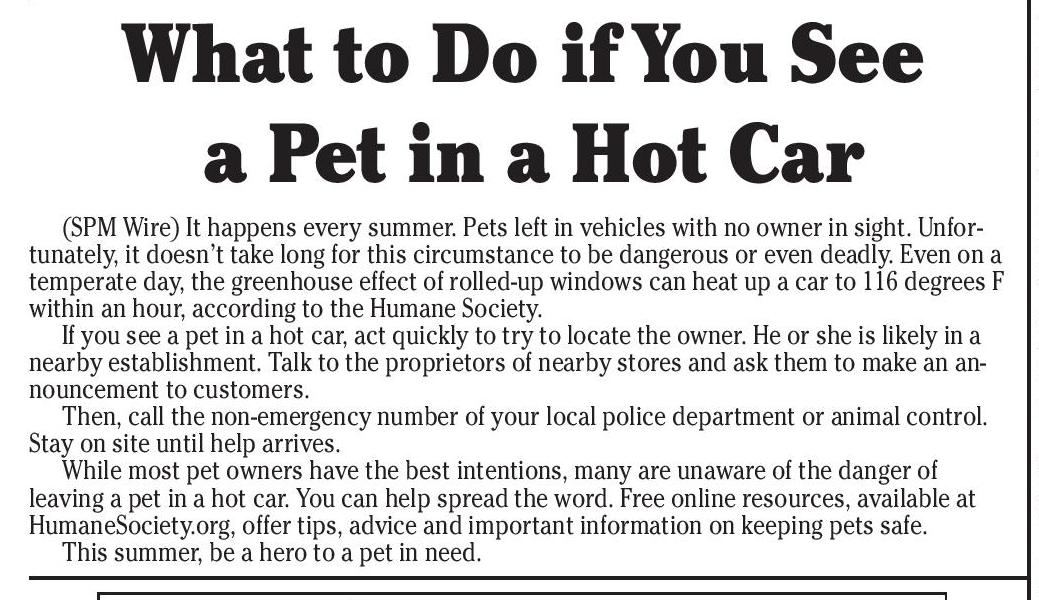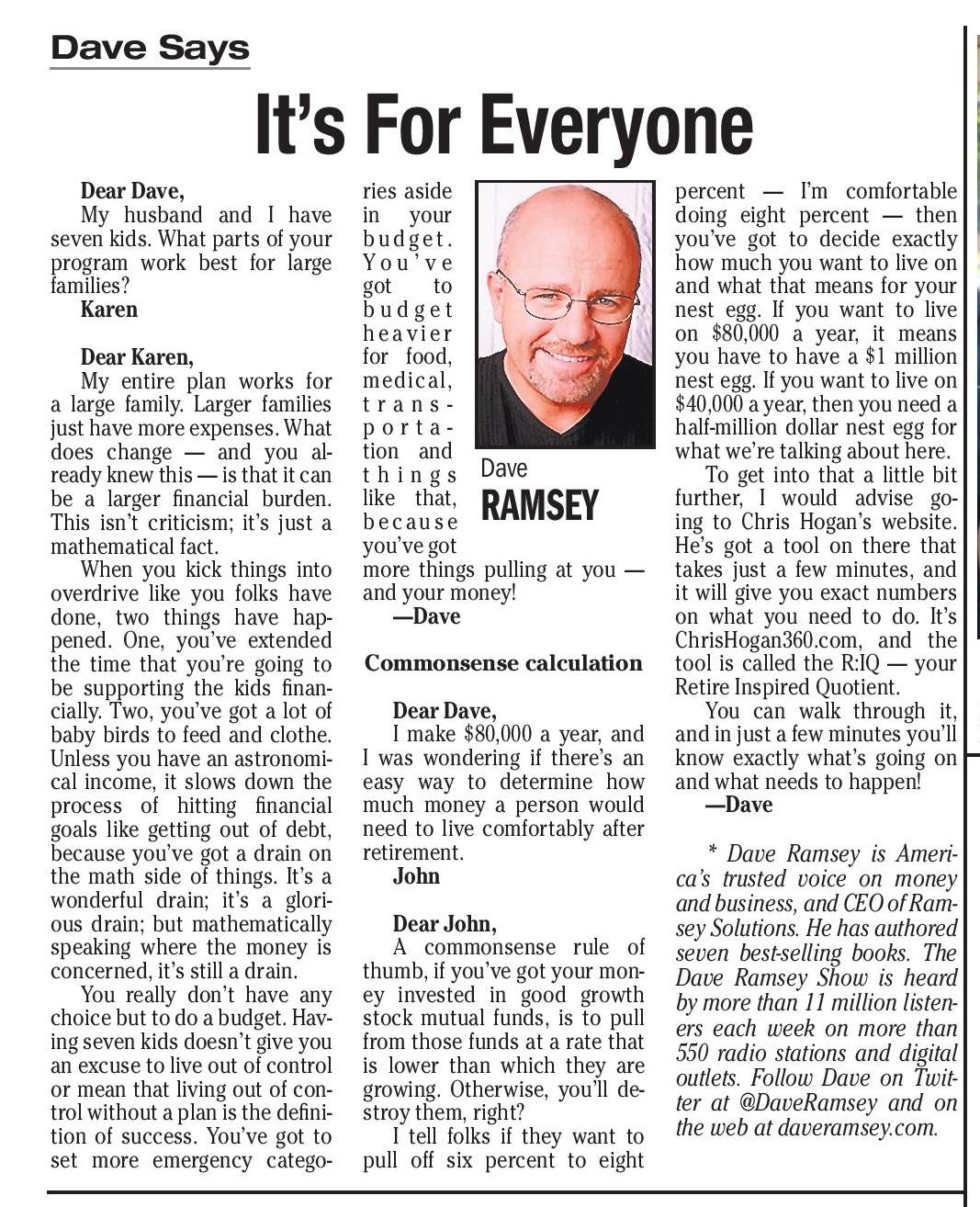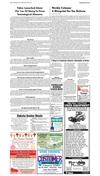2







2 Broadcaster Press
July 12, 2016 www.broadcasteronline.com
Dave Says
It’s For Everyone
Dear Dave,
My husband and I have
seven kids. What parts of your
program work best for large
families?
Karen
Dear Karen,
My entire plan works for
a large family. Larger families
just have more expenses. What
does change — and you already knew this — is that it can
be a larger financial burden.
This isn’t criticism; it’s just a
mathematical fact.
When you kick things into
overdrive like you folks have
done, two things have happened. One, you’ve extended
the time that you’re going to
be supporting the kids financially. Two, you’ve got a lot of
baby birds to feed and clothe.
Unless you have an astronomical income, it slows down the
process of hitting financial
goals like getting out of debt,
because you’ve got a drain on
the math side of things. It’s a
wonderful drain; it’s a glorious drain; but mathematically
speaking where the money is
concerned, it’s still a drain.
You really don’t have any
choice but to do a budget. Having seven kids doesn’t give you
an excuse to live out of control
or mean that living out of control without a plan is the definition of success. You’ve got to
set more emergency catego-
ries aside
in your
budget.
Yo u ’ v e
got
to
budget
heavier
for food,
medical,
transportation and
t h i n g s Dave
like that,
because
you’ve got
more things pulling at you —
and your money!
—Dave
RAMSEY
Commonsense calculation
Dear Dave,
I make $80,000 a year, and
I was wondering if there’s an
easy way to determine how
much money a person would
need to live comfortably after
retirement.
John
Dear John,
A commonsense rule of
thumb, if you’ve got your money invested in good growth
stock mutual funds, is to pull
from those funds at a rate that
is lower than which they are
growing. Otherwise, you’ll destroy them, right?
I tell folks if they want to
pull off six percent to eight
percent — I’m comfortable
doing eight percent — then
you’ve got to decide exactly
how much you want to live on
and what that means for your
nest egg. If you want to live
on $80,000 a year, it means
you have to have a $1 million
nest egg. If you want to live on
$40,000 a year, then you need a
half-million dollar nest egg for
what we’re talking about here.
To get into that a little bit
further, I would advise going to Chris Hogan’s website.
He’s got a tool on there that
takes just a few minutes, and
it will give you exact numbers
on what you need to do. It’s
ChrisHogan360.com, and the
David Lias/For The Plain Talk
tool is called the R:IQ — your
Members of the Vermillion Fire/EMS Department and the Rural Firefighters Association fill
Retire Inspired Quotient.
You can walk through it, plates as they served a meal to visitors to the family celebration the firefighters hosted in
and in just a few minutes you’ll Barstow Park on July 4.
know exactly what’s going on
and what needs to happen!
—Dave
* Dave Ramsey is America’s trusted voice on money
and business, and CEO of Ramsey Solutions. He has authored
seven best-selling books. The
Dave Ramsey Show is heard
by more than 11 million listeners each week on more than
550 radio stations and digital
outlets. Follow Dave on Twitter at @DaveRamsey and on
the web at daveramsey.com.
What to Do if You See
a Pet in a Hot Car
(SPM Wire) It happens every summer. Pets left in vehicles with no owner in sight. Unfortunately, it doesn’t take long for this circumstance to be dangerous or even deadly. Even on a
B oad
caster effect
2x1
temperate day, the rgreenhouse onlineof rolled-up windows can heat up a car to 116 degrees F
.co
within an hour, according to the Humane m
Society.
If you see a pet in a hot car, act quickly to try to locate the owner. He or she is likely in a
nearby establishment. Talk to the proprietors of nearby stores and ask them to make an announcement to customers.
Then, call the non-emergency number of your local police department or animal control.
Stay on site until help arrives.
Broad the steronlin many are unaware3x1 the danger of
While most pet owners have cabest intentions, e.com
of
leaving a pet in a hot car. You can help spread the word. Free online resources, available at
HumaneSociety.org, offer tips, advice and important information on keeping pets safe.
This summer, be a hero to a pet in need.
Broadcasteronline.c
om
4x1
VERMILLION DENTAL HEALTH
VERMILLIONDENTALHEALTH.COM
NEW OWNER!
ZACHARY KOPF
D.D.S.
.
D.S
D.
SER ARE
PF
Y P . KO
EW
GAR DR ING N
& EPT TS!
ACC ATIEN
P
S
RO
605-624-8695
11 COURT ST. VERMILLION
VERMILLIONDH@GMAIL.COM
Government
Hospitals Are Failing
Native Americans
By U.S. Sens. John Barrasso and John Thune
Needless patient suffering, fatal delays in medical treatment and retaliation against whistle
blowers. These are among the well-publicized failures investigators found at hospitals run by
the Department of Veterans Affairs. Yet they are also the shameful hallmarks of another federal
health-care system: the Indian Health Service.
Part of the Department of Health and Human Services, the Indian Health Service is required
by treaty to deliver health care to Native Americans around the country, with more than 2 million depending on this federal agency. Unfortunately, it appears to be failing. Tribal members
have told the Senate Committee on Indian Affairs about alarming conditions at hospitals run
by the IHS. During the committee’s investigation, which began last summer, we have heard
accounts of nurses unable to administer basic drugs, broken emergency-resuscitation equipment, unsanitary medical facilities, and seriously ill children being misdiagnosed.
The heartbreaking story of 45-year-old Debra Free provides one example. The Winnebago
tribal member was a patient at an IHS hospital in Nebraska in 2011. Overmedicated and unsupervised, she became dizzy and fell out of bed. Ms. Free died a few hours later. An incident like
this never should have happened, and nothing can make up for the loss, suffering and injustice
that her family has endured.
Ms. Free’s sister, a nurse at the facility, demanded answers. Rather than help, hospital staff
retaliated by reporting her to the state board of nursing, which found the accusations against
her baseless. “For years we have trusted the IHS to do its job,” Debra’s niece told our committee at an oversight hearing in February. “Over and over again, the IHS has failed.”
The situation has gotten so bad that have issued multiple Statements of Deficiencies over
the past few years identifying four IHS hospitals in the Great Plains that are putting patients in
“immediate jeopardy.” Our investigators have found evidence that the IHS, like the VA, maintains a culture of cronyism and corruption. Many staff members collect government paychecks
without fear of accountability.
Tribal leaders have written to the Department of Health and Human Services identifying
underperforming supervisors and upper-level management personnel who deserve firing. Our
committee’s investigation found no sign that these employees were terminated. Instead, poorly
performing employees are transferred to other facilities and, in some cases, even given pay
raises and promotions with no record of bad performance ending up in their work file.
Quality health care for Native Americans will require a culture change at the agency—from
the leadership in Washington down to hospital staff in the field. Simply sending more money to
IHS is not a solution, and it ignores the magnitude of the problems. According to HHS, Indian
Health Service funding has grown by 43% since 2008. Some IHS hospitals in the Great Plains
Area—which includes Iowa, Nebraska, North Dakota and South Dakota—actually had money
left over at the end of the last fiscal year, and chose not to spend it on patient care.
Tribes urgently seek accountability from the IHS. This should include mandatory reporting
for patient-safety violations and cases of alleged retaliation against patients and whistle-blowing employees. Partly because the federal hiring process is so cumbersome, it can take a year
to fill staff vacancies. Firing a poor performer can take even longer, and requires an enormous
amount of paperwork and documentation.
Hospitals make do by using temporary and costly doctors and nurses who may leave after only a few weeks. This is unacceptable. Where there are vacancies, hospitals should be
required to fill them with permanent, quality providers. And they should be allowed to do so
without months of wasteful bureaucratic delays.
The IHS employs many good people. They work under difficult conditions to deliver care in
some of the poorest and most remote areas of the U.S. Although its employees deserve support
and assistance, the agency has lacked competent and accountable leadership for far too long.
Because the IHS can no longer be a place where inept, entrenched employees come first and
patients come last, we have introduced the IHS Accountability Act of 2016. Our bill improves
transparency, makes it easier to fill jobs and reward good workers. It also eliminates barriers to
disciplining or firing problem employees. The legislation requires Health and Human Services
to increase its oversight of the IHS, including taking more responsibility for investigating patient deaths. It also improves protections for employees who report patient safety concerns.
The IHS’s neglect of these Americans is appalling. No one should be treated like Debra Free
and her family. They deserved better, and so do all tribal citizens.
IMPROVE WORKING CONDITIONS
FOR YOUR FEET.
FREE SOCKS SALE!
Boston 3rd • Yankton • to Boots
Shoes 665-9092
312 W.
In stock. 6” & 8” styles. Up to 4E wide & size
15 in stock. Available in Safety & Non-Safety Toe.
Buy Local!
Shop the
Classifieds!
ORTS
L & SP
CHOO
S
July & August
Specials
Athletic Physical $25
Kindergarten Physical $30
Custom Month Guard $35
Yankton Clinic
Medical • Dental • Mental
20-60% off
Hurry in for best selections
Now thru July!
Women's clothing,
accessories, sandals, boots,
jewelry, scarves and more!
Alcester 605.934.2122
Alcester Dental 605.934.2251
Elk Point 605.356.3317
Yankton 605.260.0310
allPOINTSHealth.com
120 W. Main St., Suite 102,Vermillion • 605.658.1100


















 Previous Page
Previous Page






